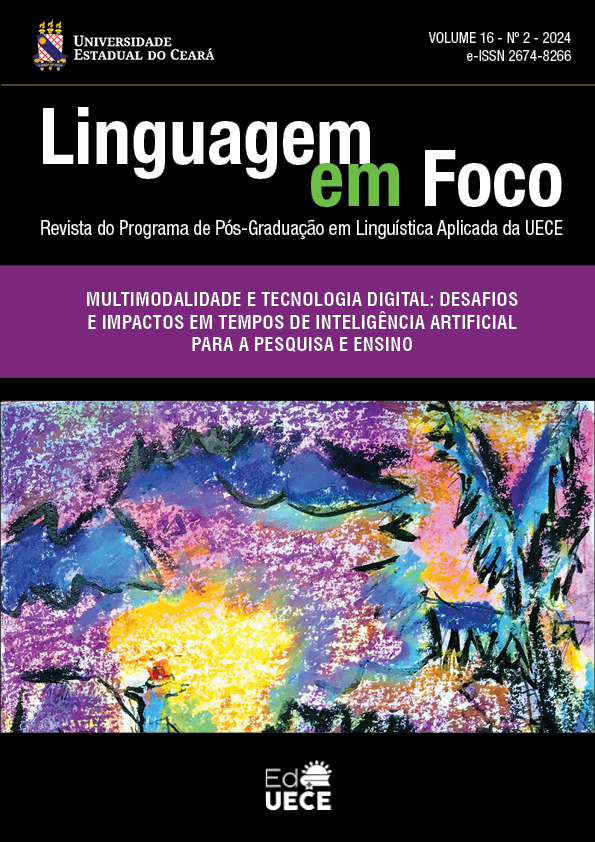AI and new mediations
critical learning of journalism students for multimodal productions
DOI:
https://doi.org/10.46230/lef.v16i2.13224Keywords:
artificial intelligence, multimodality, mediation, higher educationAbstract
The purpose of this article is to reflect on contemporary university training for journalists, based on the multimodal production of informative texts in a scenario permeated by the presence of artificial intelligence (AI) models and tools. We work with Kress's (2003) concept of multimodality and add Ribeiro's (2016) reflections on multimodal productions, which are already very present – with a tendency for the number of these products to increase – in the daily routine of journalistic content produced and consumed. To achieve this objective, we analyzed the Pedagogical Plans (PPCs) – guiding documents for higher education, prepared based on the National Curricular Guidelines (DCN) of the Ministry of Education – of journalism courses at two universities in Minas Gerais, one private and one public. Based on these documents, both from 2023, we point out challenges and opportunities for the inclusion of AI-related topics, in order to offer technical and ethical training that enables graduates to work in the professional market that is (re)configuring itself.
Downloads
References
BARBOSA, V. S.; ARAÚJO, A. D.; ARAGAO, C. Multimodalidade e multiletramentos: análise de atividades de leitura em meio digital. Revista Brasileira de Linguística Aplicada, v. 16, p. 623-650, 2016. DOI https://doi.org/10.1590/1984-639820169909. Disponível em: https://www.scielo.br/j/rbla/a/pM68n9gfxmRZZzVVRzvdSBC/. Acesso em: 29 ago. 2024.
CARPES, G. O mínimo que um jornalista precisa saber sobre inteligência artificial para começar 2024. Farol Jornalismo. Disponível em: https://faroljornalismo.cc/arquivos/Guia%20IA%20Farol%20jornalismo.pdf. Acesso em 27 mai 2024.
COSTA VAL, M. da G. Repensando a textualidade. In: AZEREDO, J. C. de. Língua portuguesa em debate: conhecimento e ensino. Rio de Janeiro: Vozes, 2000. p. 34-51.
CRUZ, L. T. de S. Plataformização do texto: reconfiguração de práticas de escrita e edição a partir de mediações algorítmicas do Google. 2023. 280f. Tese (Doutorado em Estudo de Linguagens) - Programa de Pós-Graduação em Estudo de Linguagens do Centro Federal de Educação Tecnológica de Minas Gerais, 2023.
DALBEN, S. Uso de inteligência Artificial nas Redações Jornalísticas na Guerra Contra a Corrupção na América Latina. In: CANAVILHAS, J.; RODRIGUES, C.; MORAIS, R.; GIACOMELLI, F. (eds.). Mobilidade e inteligência Artificial. Os Novos Caminhos do jornalismo. Covilhã: Livros LabCom, 2022. p. 421-44.
KAUFMAN, D. A inteligência artificial irá suplantar a inteligência humana? São Paulo: Estação das Letras e Cores, 2019.
KAUFMAN, D. Inteligência artificial: repensando a mediação. Brazilian Journal of Development, v. 6, n. 9, p. 67621-67639, 2020. DOI https://doi.org/10.34117/bjdv6n9-264. Disponível em: https://ojs.brazilianjournals.com.br/ojs/index.php/BRJD/article/view/1648. Acesso em 24 mai 2024.
KRESS, G. Literacy in the new media age. Londres: Routledge, 2003.
LEAL, B. S. Do texto à textualidade na comunicação: contornos de uma linha de investigação. In: LEAL, B. S.; CARVALHO, C. A.; ALZAMORA, G. Textualidades midiáticas. Belo Horizonte: PPGCom/UFMG, 2018. p. 17-34.
LEMOS, A. Epistemologia da comunicação, neomaterialismo e cultura digital. Galáxia (São Paulo), n. 43, p. 54-66, jan/abri 2020. DOI https://doi.org/10.1590/1982-25532020143970. Disponível em: https://www.scielo.br/j/gal/a/DvNQBjKxf4hBZf3cQHBL5FL/. Acesso em: 29 ago. 2024.
PAIVA, F. A. O gênero textual infográfico: leitura de um gênero textual multimodal por alunos da 1ª série do ensino médio. Revista l@ el em (dis-) curso, v. 3, n. 1, p. 87-101, 2011. Disponível em: https://www.academia.edu/97469010/O_G%C3%AAnero_Textual_Infogr%C3%A1fico_leitura_de_um_g%C3%AAnero_textual_multimodal_por_alunos_da_1a_s%C3%A9rie_do_Ensino_M%C3%A9dio. Acesso em: 29 ago. 2024.
REPORTERS SANS FRONTIÈRES. Paris Charter on AI and Journalism. 2023. Disponível em: https://rsf.org/sites/default/files/medias/file/2023/11/Paris%20Charter%20on%20AI%20and%20Journalism.pdf. Acesso em 30 jul. 2024.
RIBEIRO, A. E. Textos multimodais: leitura e produção. São Paulo: Parábola Editorial, 2016.
SANTOS, M. F.; CERON, W. Inteligência Artificial na mídia: visões atuais e projeções futuras. In: CANAVILHAS, J.; RODRIGUES, C.; GIACOMELLI, F. Mobilidade e inteligência Artificial: os novos caminhos do jornalismo. Covilhã: Labcom, 2022. p. 445-474.
SANTAELLA, L. Pensar a inteligência artificial: cultura de plataforma e desafios à criatividade. Belo Horizonte: Fafich/Selo PPGCOM/UFMG, 2023a.
SANTAELLA, L. Para não perder o bonde do ChatGPT. In: Transobjeto. 2023b. Disponível em: https://transobjeto.wordpress.com/2023/01/30/para-nao-perder-o-bonde-do-chatgpt/. Acesso em 21 mai 2024.
SAYAD, A. L. V. Inteligência artificial e pensamento crítico: caminhos para a educação midiática. São Paulo: Instituto Palavra Aberta, 2023. Disponível em: https://educamidia.org.br/api/wp-content/uploads/2023/06/01-Palavra-Aberta-A-inteligência-artificial-DIGITAL.pdf. Acesso em 24 mai 2024.

Downloads
Published
How to Cite
Issue
Section
License
Copyright (c) 2024 Luana Teixeira de Souza Cruz, Eliziane Cristina da Silva Oliveira

This work is licensed under a Creative Commons Attribution 4.0 International License.
Authors who publish in Linguagem em Foco Scientific Journal agree to the following terms:
- Authors retain the copyright and grant the journal the right of first publication. The articles are simultaneously licensed under the Creative Commons Attribution License which allows sharing the work with an acknowledgement of its authorship and initial publication in this journal.
- The concepts issued in signed articles are the absolute and exclusive responsibility of their authors. Therefore, we request a Statement of Copyright, which must be submitted with the manuscript as a Supplementary Document.
- Authors are authorized to make the version of the text published in Linguagem em Foco Scientific Journal available in institutional repositories or other academic work distribution platforms (ex. ResearchGate, Academia.edu).




























